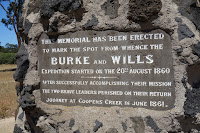 |
| Longstaff: Arrival of Burke, Wills, and King at the deserted camp at Cooper's Creek |
Burke and Wills are Australia's equivalent of the United States' Lewis and Clarke, men who walked the south to north length of the continent--from Melbourne 1,500 miles to the Gulf of Carpentaria--exploring its deepest reaches. Unfortunately, the result was fatal to both men and several others. When they returned exhausted and weakened after several months to the base camp at Cooper's Creek, those waiting had left earlier that very same day, leaving Burke and Wills to die in the wilderness several weeks later. A rescue party found their companion King on the site shortly after, emaciated and confused, but alive because of help from native people. He lived to tell the story from his point of view, and the buried diaries kept by the protagonists were also recovered.
Alan Moorehead wrote an strikingly evocative version of the story. Here's an excerpt about the northward trek:
It was never easy walking. Anyone who has been in the centre of Australia will bear witness to those sharp, ankle-twisting stones, the clay as hard as concrete and full of cracks, the peculiar stickiness of mud in the swamps. After the first few steps the sweat starts out and one has to keep one hand free and swing across one's face to deal with pestilential, never-ending flies. One sees and hears and smells far more, of course, when one is one foot, but the mechanical monotony of this tremendous walk is something not easily understood by a twentieth-century mind; hour after hour, mile after mile and always the same plain ahead; never to arrive at anywhere really significant; always to get up in the morning with the prospect of doing the same thing all over again. The world narrows in these conditions; one's boots have the disembodied fascination of a clockwork pendulum, weariness is subdued by the dull compulsion of the rhythm, and ground is not ground but simply distance to put behind one. In this apathy of movement, this concentration merely upon keeping going, this coma of walking, any intrusion is resented, and any call upon the mind is an effort.
And then there is this extraordinary depiction of the natural scene, presented in ironic combination with an indication of what life was like for William Brahe's group left behind at the Cooper's Creek base camp:
It must have been a life of extraordinary dullness; one suspects that they sat around for hour after hour drinking tea and simply gazing at the campfire; without books, without work, without amusement of any kind, what else was there for them to do? [But] despite its drabness and its heavy stillness and silence the bush had its moments of spectacle as well. In central Australia fantastic dawns and sunsets break across the sky; colours of such leaping brilliance that all the earth, ever bush and tree and the dry ground itself, is illuminated for a few minutes in shades of scarlet, orange, pink and gold.
. . . As the full fierce blaze of the sun begins to soften at last, the white cockatoos, the corellas, come in by the thousand, screeching hideously, and they settle on one tree after another, never quite able to make up their minds. On the ground the timid little coots that have been hiding in the reeds all day emerge into the open and come nervously down to the water to drink. The slightest disturbance is enough to make them scuttle back into cover again, and with their black feathers and red beaks they look like frightened chickens as they run. Now everywhere the trees are alive with parrots and coackatoos--the mulgas skimming by in green flocks, the parrot-cockatoos in grey, the Major Mitchells in pink--and it is not possible for the eye to follow all the arrivals and departures, the plovers, the eagles, crows, and harlequin colours of the blue-bonnets, the little waxbills, the ring-necks and the herons.
 |
| Galahs |
And then there's the truly tragic moment when Brahe returns to Cooper's Creek one last time, just in case Burke and Wills might have shown up after all. But Burke and Wills and King had set out on what was to be an aborted attempt to try to return home. At this moment, the two groups were just a few miles apart, and Brahe's freshly reinforced group could easily have caught up with the slow-moving explorers. But Brahe fell victim to anchoring and confirmation bias:
The place was silent and deserted. They tethered their horse to the trees and went inside the stockade. The cache appeared to be undisturbed, the camel-dung raked over the ground as it had been before. They saw camel tracks about the camp, but Brahe presumed that those had been left by his own animals before he left the depot. It was true that there were the ashes of three fresh campfires on the ground, but the blacks were always making such fires, and no doubt, Brahe decided, some of them had camped here since his departure. . . . Brahe did not notice that the rake had been moved, nor the bits of rag that King had hung there, nor the square that had been cut out of the leather door. He did not see the billy that King had left behind, or at any rate placed no significance upon it. The blazes were there on the trees with nothing added. In other words, Brahe saw what, no doubt, he wanted to see: that nothing had been disturbed, that he had been right to come away from the depot when he did.
Brahe's conscience was clear. He went off feeling . . . that he could do no more.

The writing is pretty impressive!
ReplyDelete